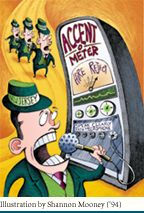 |
|||||||||||||||||
|
|
||||||
|
E-mail: north_texan@unt.edu Fax: (940) 369-8763 U.S. Mail: University of North Texas, The North Texan P.O. Box 311070, Denton, Texas 76203-1070 Submit a letter using the online form.
|
High cost of care As someone who talks with people every day about caregiving, I strongly support your recommendation that children begin addressing the possibility of care for their parents now instead of waiting until the time of needing care (“Trading Places,” spring 2001). The one area your article did not discuss was the high cost associated with caregiving. In the Dallas-Fort Worth area, the average cost for a semiprivate room in a nursing home is approximately $100 a day, $36,000 a year. Assisted living facilities can cost $80 a day or $29,000 a year. Average cost for a home health aid is approximately $15 an hour and many have four-hour minimums. As you can imagine, it would not take long for a family to go through a substantial amount of their assets in paying for long-term care. Many people assume that if they ever need special care, Medicare or a Medicare supplement policy will see them through. That is a common assumption. But, unfortunately, it is inaccurate. Medicare only pays for a short period of time. The only government program that pays for long-term care is Medicaid, but Medicaid is a welfare program for the poor and needy. To qualify for Medicaid, a person must become virtually impoverished. That may mean spending down their life’s savings and getting rid of what they have worked hard for all their lives. If families have the foresight to address the possibility of an aging relative needing care at some point in the future, they must also plan on how they will pay for the care. A very logical solution is long-term care insurance. The long-term care insurance plans today are very good and the cost is extremely low in comparison to the payback. Art Hull
(’65)
Reading your great article “Accents Speak Louder Than Words” (winter 2000) brought a flood of memories. I was transported to the speech (was it called 101?) class of Mrs. Myrtle Hardy (I think that was her name.) I was a freshman in the fall of 1946 and thought I was a speech major. I have a clear vision of the “Six Texas Dialect Errors” written on the board. It was Mrs. Hardy’s dedication in life that no one leave that class sounding like a Texan. To sound like a Texan meant that you would never succeed in life, never get a decent job, never be accepted in polite society. I am glad that times have changed, but I still wince when I hear one of the “Six” (even though I can no longer write them phonetically — nor can I pronounce them right now). Mrs. Hardy was not, as I recall, a native Texan. I transferred away as a junior and later did graduate work at the University of Michigan and Claremont Graduate School. I have always been grateful for the happy, friendly, family-like two years in Denton. Molly S.
King
Ordinary people II Regarding
the letter in the winter 2000 North Texan about stories of
ordinary alumni: Yep, there are bunches of us out here. I began
North Texas in 1950, just days after my 17th birthday. And I lived
in Bruce Hall, the newest dorm at the time. I recall vividly the
wearing of the freshman green beanies and that we had to say hello
to everyone we passed. Kinda scary for such a young kid with not
too much self-confidence. But one thing I did decide to do was to
become a more confident person. I talked to the people who were
in the cafeteria line and visited with the students while we were
eating, and I soon became comfortable with a large number I met my husband my sophomore year and was determined to graduate as quickly as possible so we could marry. I did my student teaching during that summer session of ’53 and was a distinct failure, passing with a C, but I discovered during that time that I loved it. I spent 20 years in the Dallas classrooms, teaching kindergarten, first and second grades. My NT husband was a physics major but converted his math and science background into a career in computer programming and system analysis. And we have a daughter who graduated from North Texas with a history degree. We are ordinary
people, but North Texas gave us solid footing and a legacy Emily Bennett
|
|||||

 The
Texas six
The
Texas six